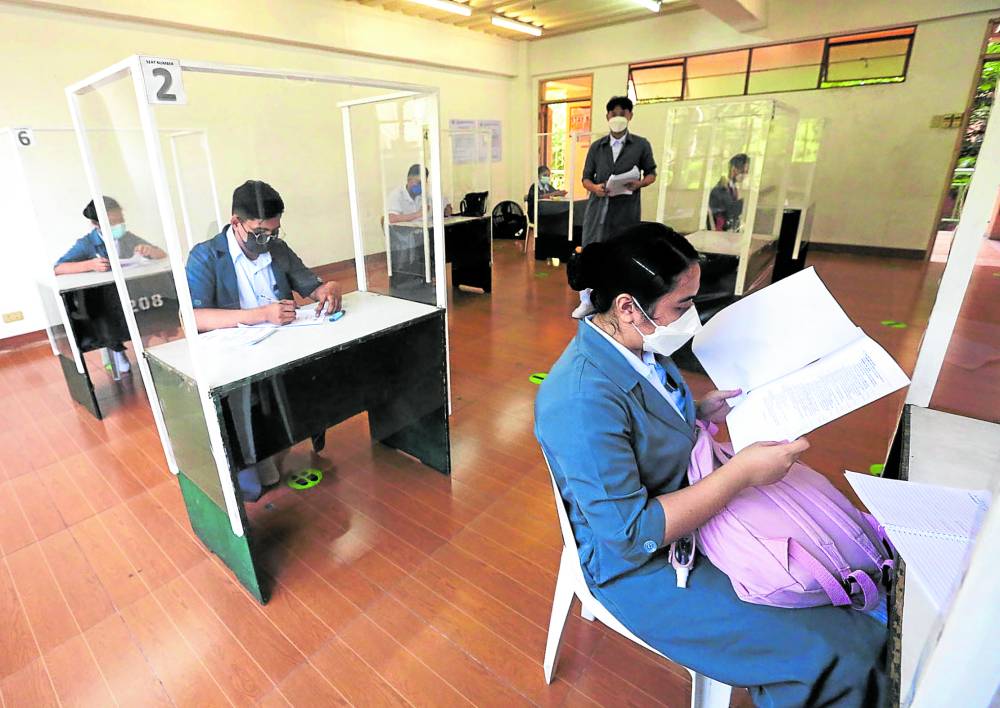College classes back to full capacity in ‘level 1’ areas

EARLIER SETUP Classrooms looked like this in November 2021 for nursing students at Universidad de Manila, which was among the first to try limited in-person classes at the college level. On Friday, the government finally allowed higher education institutions to accept students at 100-percent capacity. —MARIANNE BERMUDEZ
MANILA, Philippines — Full classrooms for higher education students are now in effect, with the government’s pandemic task force allowing colleges and universities to hold in-person classes at 100-percent capacity in areas under the least restrictive alert level 1.
But only fully vaccinated students and academic staff are allowed entry into school premises, the Inter-Agency Task Force for the Management of Emerging Infectious Diseases (IATF) stated in its Resolution No. 164.
Unvaccinated or partially vaccinated students are to continue their studies under flexible learning modalities, the IATF said.
There are no restrictions on the operation of school dormitories, but colleges and universities are obliged to coordinate with their respective local government units (LGUs) before opening the dorms, it said.
In-person graduation
It added that colleges and universities should also ensure that students participating in in-person classes would be registered with Philippine Health Insurance Corp. (PhilHealth) or an equivalent medical insurance that covers medical expenses related to COVID-19.
The IATF’s Technical Working Group recommended that students above 21 with no visible means of income be enrolled in PhilHealth as indigent members, and those younger be classified as dependents of their parents or legal guardians.
The task force also said it would be up to the schools to choose the learning modalities they would use, as long as continuity of learning would be ensured.
Face-to-face classes have been allowed under alert level 2, but only up to 50-percent classroom capacity.
In another positive development, elementary and high school students may be able to participate in in-person graduation, or end-of-the-school-year (EOSY) rites, in June or July, granted that the improved COVID-19 situation does not worsen.
The possibility of in-person graduation comes two years after the suspension of mass gatherings due to the pandemic. The Department of Education (DepEd) has recommended that schools in areas under alert levels 1 and 2 be allowed to conduct limited face-to-face EOSY rites, Alma Ruby Torio, assistant secretary for curriculum and instruction, announced during a virtual press briefing on Friday.
Torio said these schools should consult with their respective LGUs and parent associations to ensure compliance with minimum health protocols, especially physical distancing.
DepEd earlier said in-person EOSY rites would be strictly regulated, especially in terms of social distancing requirements, to prevent these activities from turning into superspreader events.
June 27-July 2
One of the models it was considering was holding the graduation ceremony by batch of students.
Schools under alert levels 3, 4, and 5 may only conduct the ceremony online. They have the discretion to broadcast it live through an appropriate social media platform.
The National Capital Region and 38 other areas are now under alert level 1, in which commercial establishments are allowed to operate at 100-percent capacity. The rest of the country is under alert level 2.
In accordance with the DepEd school calendar, it was recommended that EOSY rites be conducted between June 27 and July 2. Those under extended school calendars because of pandemic-related class suspensions may conduct them from July 4 to July 16.
Graduation rites
EOSY rites are for kindergarten, Grade 6, Grade 10, and Grade 12 learners who have met the curriculum requirements, and for learners who have passed the portfolio assessment in the Alternative Learning System in the elementary and junior high school levels.
According to Torio, the recognition rites for other grade levels may also be conducted virtually or on a limited face-to-face setup.
“However, if done on a limited face-to-face setup, these must be conducted separately from the graduation rites or moving up or completion ceremonies, to ensure physical distancing and adherence to health protocols,” she said.
Expenses
DepEd reminded the authorities of public schools that would be conducting in-person graduation and recognition rites that the expenses incurred will be charged against their budget for maintenance and other operating expenses.
“No DepEd official or personnel shall be allowed to collect any kind of contribution or graduation fee for moving up or completion ceremonies and recognition rites,” Torio said.
RELATED STORIES
IATF OKs 100% capacity in college, university in-person classes in Alert Level 1 areas
DepEd unit proposes physical end-of-school-year rites in Alert Level 1 and 2 areas
For more news about the novel coronavirus click here.
What you need to know about Coronavirus.
For more information on COVID-19, call the DOH Hotline: (02) 86517800 local 1149/1150.
The Inquirer Foundation supports our healthcare frontliners and is still accepting cash donations to be deposited at Banco de Oro (BDO) current account #007960018860 or donate through PayMaya using this link.